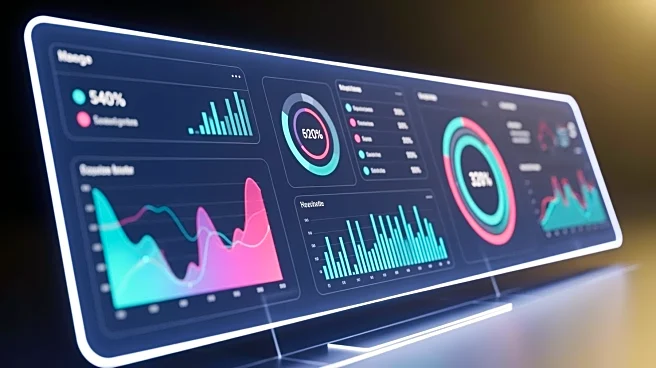What's Happening?
Customer Relationship Management (CRM) dashboards are becoming increasingly vital for businesses seeking to streamline data collection and analysis. These dashboards provide a user-friendly interface that
summarizes key data points through graphs and charts, allowing teams to access and visualize information from various parts of CRM software. Customizable dashboards can be tailored to support specific workflows, making them particularly useful for customer service, marketing, sales, and executive teams. Features such as real-time data syncing, customizable displays, and smooth integration with other tools are essential for maximizing the utility of CRM dashboards. Popular platforms like Salesforce, HubSpot, Zendesk, Monday.com, and Zoho offer varying levels of customization and pricing plans to cater to different business needs.
Why It's Important?
The adoption of CRM dashboards is crucial for businesses aiming to enhance their data-driven decision-making processes. By providing a centralized hub for customer information and activity tracking, CRM dashboards help companies manage customer relationships more effectively. This can lead to improved customer satisfaction, increased sales performance, and better marketing engagement. Businesses that leverage CRM dashboards can gain a competitive edge by optimizing their operations and aligning their strategies with real-time insights. As companies continue to prioritize data accessibility and efficiency, CRM dashboards are likely to play a pivotal role in shaping business practices and outcomes.
What's Next?
As CRM technology evolves, businesses can expect further advancements in dashboard customization and integration capabilities. Companies may increasingly rely on CRM dashboards to automate processes and enhance collaboration across departments. The demand for intuitive and comprehensive data visualization tools is likely to grow, prompting CRM providers to innovate and expand their offerings. Businesses should stay informed about new features and updates to ensure they are maximizing the potential of their CRM systems. Additionally, ongoing feedback from users will be essential for refining dashboard designs and functionalities to better meet organizational needs.
Beyond the Headlines
The rise of CRM dashboards reflects a broader trend towards data-centric business models. As organizations become more reliant on data to drive decisions, ethical considerations around data privacy and security will become increasingly important. Companies must navigate these challenges while ensuring compliance with regulations and maintaining customer trust. The integration of artificial intelligence and machine learning into CRM systems may further transform how businesses interact with data, offering new opportunities for predictive analytics and personalized customer experiences.












